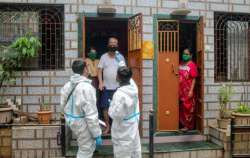No home isolation in rural areas and slums in urban areas of Karnataka: Govt
The Karnataka government on Saturday decided not to allow home isolation of COVID patients in rural areas and slums in urban regions, and to make necessary arrangements to ensure they get admitted mandatorily in Covid Care Centres (CCCs).

The Karnataka government on Saturday decided not to allow home isolation of COVID patients in rural areas and slums in urban regions, and to make necessary arrangements to ensure they get admitted mandatorily in Covid Care Centres (CCCs).
At the meeting of the state's COVID task force held here today, several decisions were made with regard to ICU beds, oxygenated beds, vaccination, drugs and consumables procurement, black fungal mitigation, and strengthening of health infrastructure in both rural and urban areas.
"In rural areas also COVID infected are currently going for home isolation. It has been decided to stop this immediately and all those infected should be admitted to isolation centres or CCCs for treatment," Deputy Chief Minister C N Ashwath Narayan said.
Speaking to reporters after the meeting, the DCM who also heads the task force said, CCCs will be established at PHC level.
The DCM said at the meeting it was decided to start administering the first dose of Covishield for those above 45.
"As the gap between first and the second dose of the Covishield vaccination has been increased from 4-6 week duration to 12-16 weeks, it has been decided to give a second dose to those whose are due and to start administering first dose to those above 45.It was earlier decided to stop first dose until those due for second are completed," he said.
However in the case of Covaxin, it has been decided to administer the second dose to those above 45 years who are due on priority and then start administering the first dose, he said, adding that "for those between 18-45 years, it has been decided to give vaccine after the app that is being developed is interfaced with COVIN app."
The subject of global tender for vaccines also came up at the taskforce meeting and it has been approved, Narayan said. "We will be sourcing it from various companies."
"Earlier it was mentioned about sourcing 2 crore vaccines from one company, now it has been decided to split it into four with 50 lakh vaccines each," he said.
Global tender for vaccines needs funding of Rs 843 crore and the task force approved this, a release from his office said.
It has also been decided to vaccinate more front line workers and those providing essential services on priority, like those working with banking, postal and internet services, and those who come in contact with the public, the DCM said.
It has been decided to consider those working at crematorum as frontline workers and also to provide them with insurance under the Pradhan Mantri Garib Kalyan Yojana, he added.
It was decided at the meeting that in every district hospital 100 ICU beds shall be made available on a permanent basis, and for this, required infrastructure and manpower need to be provided and all these should have oxygen generating units.
According to the release, the Centre will be asked to provide 20,000 vials of Amphotericin B to tackle black fungal infections as there is shortage of the drug and it is estimated that about 400 cases are expected per week in the days to come.
Oxygen bottling plants will be set up in 9 districts that do not have this facility.Oxygen generators of 200-300 ltr/minute will be set up in community health centres.
All the beds will be oxygenated in all taluk hospitals and to facilitate this, oxygen generators of capacity 500-600 ltr/minute will be set up, it said.
Global tender will be issued to procure 5 lakh Remdesivir injections and Rs 75 Crore kept reserved for this purpose.
Also it has been decided to procure 1 lakh pulse oximeters, and to set up 100 bedded secondary hospitals in each assembly constituency of Bengaluru and 1 tertiary care hospital for every 4 constituencies.
On relieving the city civic body, Bruhat Bengaluru Mahanagara Palike, from the responsibility of health management of the city, the release, quoting the DCM, said, the task force decided to review bifurcating the health management system in Bengaluru and proposed to move it to Health and Family department.
However, to make this a reality certain technical issues need to be studied and a committee will be constituted to look into this and will be asked to submit the report at the next meeting of the task force, it said.